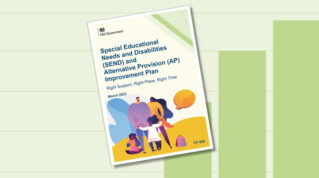The long-awaited SEND and AP green paper recognises the many challenges the sector currently faces. From inconsistent, overly bureaucratic processes and long delays in processing EHCPs to a national shortage of SEND professionals, including educational psychologists and speech therapists – these are common issues that our own SEND and AP schools are dealing with every day and await reforms.
So it’s clear that reform is needed, and it is positive to finally have movement towards some real change. We know first-hand that parents and carers of children with SEND often struggle to access the support they need. CAMHS waiting lists are extremely long, with mental health issues among young people at an all-time high. The entire system is stretched to unprecedented levels post-pandemic.
Schools can’t tackle the problems by themselves. Ensuring a child with SEND can reach their full potential relies on a fully holistic approach with input from many other agencies, including health and social services. Getting a timely EHCP is a fundamental part of this process. Yet this has become a major issue, and in many cases is failing to support the families who need it most.
The green paper’s commitment to digitising EHCPs makes sense in terms of bringing the system into the 21st century and will hopefully make them easier to use and understand. However, this is evading the real problem. We are seeing children who desperately need to access our special provisions but are awaiting an EHCP. We can’t take them on until they have this document, even when their need for special education is clearly having a negative impact on their mental and emotional health, as well as on their learning.
If young people can’t access the system in the first place, any improvement measures within the system will obviously be less impactful. That’s rather ironic, considering the green paper’s consistent focus on early intervention and national standards.
Our own multi-academy trust works across three local authorities, and it’s clear that parents and carers can find themselves in a postcode lottery when it comes to funding and support. Standardising this – as is being proposed with a national framework – would be of huge benefit, providing clarity on entitlement fairly across the country for each child.
And where we talk about enabling a young person to reach their full potential, this must focus on their entire educational journey if it is to be truly meaningful. Our college-sponsored MAT very much supports the retention of 0-25 EHCPs as they provide a clear line of sight to adulthood, supporting parents and students through each transition phase.
However, EHCPs usually cease on admission to higher education. As the FE adviser to the Office for Students’ disabled students commission, I have argued for some time that extending EHCP support for academically able SEND students would improve transition and provide continuity.
The green paper proposals recognise this could be a real improvement on the current arrangements, which are bureaucratic, time-consuming and lead to duplication. They involve applying for the Disabled Students’ Allowance, which is a process that all too often leaves students on a cliff edge and at a significant educational disadvantage to their peers when starting HE courses.
Children need access to high-quality, personalised support from day one. This must then continue throughout their educational journey so they can progress successfully into appropriate destinations – whether this is HE, an apprenticeship, employment or a supported internship.
Ensuring alternative provision has an integral role within the SEND system will play an important part in delivering this ambition. Many students in AP have undiagnosed SEND and improved alignment of the two will facilitate better and earlier intervention – leading to better outcomes for young people.
So all in all, the proposals in this green paper are encouraging and recognise many of the challenges we face. But there is scope for improvement on the journey from green paper to enacted reform – and precious little time to deliver necessary change for struggling young people and families.
















Your thoughts